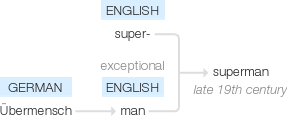Superman
late 19th century (in superman (sense 2)): from super- ‘exceptional’ + man, coined in imitation of German Übermensch (used by Nietzsche).
wiktionary
A calque of German Übermensch; super- + man. The German word was introduced by the philosopher Friedrich Nietzsche (1844–1900) in his work Also sprach Zarathustra (Thus Spoke Zarathustra, 1883), and rendered in English as superman by Irish playwright George Bernard Shaw (1856–1950) in the play Man and Superman (1903) and by Thomas Common (1850–1919) in his 1909 translation of Nietzsche’s work. Some scholars regard this word as not properly conveying the meaning of Übermensch, and prefer to use the German word or overman.
The “person of extraordinary powers” sense was reinforced by the DC Comics’ character Superman, who first appeared in Action Comics #1 dated June 1938.
etymonline
superman (n.)
1903, coined by George Bernard Shaw to translate German Übermensch, "highly evolved human being that transcends good and evil," from "Thus Spake Zarathustra" (1883-91), by Friedrich Nietzsche (1844-1900). The German word was first used in German by Hermann Rab (1520s), and also was used by Herder and Goethe. It was Englished as overman (1895) and beyond-man (1896) before Shaw got to the modern version in his play title "Man and Superman" (1903). Application to comic strip hero is from 1938.
So was created ... Superman! champion of the oppressed, the physical marvel who had sworn to devote his existence to helping those in need! ["Action Comics," June 1, 1938]
His ability to leap tall buildings in a single bound dates from 1941; the "Action Comics" introduction is less succinct: "When maturity was reached, he discovered he could easily: Leap 1/8th of a mile; hurdle a twenty story building ..."
